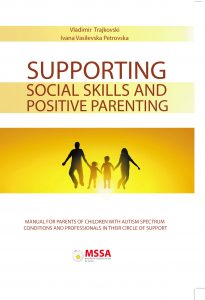Почитувани,
Често за децата со аутизам се мисли дека не се социјални или дека немаат желба за комуникација и дружење. Напротив, децата со состојби од аутистичниот спектар често не располагаат со вештини за секојдневно социјално однесување, па овие тешкотии треба да се препознаат и да се опфатат во една сеопфатна индивидуална програма. Со оглед на важноста на социјалните интервенции за децата со аутизам, императив за професионалците и родителите е да имаат пристап до ресурси посветени на социјалното однесување.
Водени од ова, го подготвивме Прирачникот „Поддршка на социјални вештини и позитивно родителство“ наменет за родители на деца со состојби од аутистичен спектар и професионалци од нивниот круг на поддршка, публикуван во партнерство со Уницеф и поддршка од Владата на Обединетото Кралство и Британската амбасада во Скопје. Прирачникот нуди различни пристапи, практики и сугестии базирани на докази за родителски вештини за деца и млади со аутизам.
Четири месеци по публикувањето, разговаравме со родителите за да дознаеме кое е нивното мислење за оваа публикација. Особено сме горди на она што тие имаа да го споделат со нас. Прочитајте во продолжение:
„Прирачникот генерално ми се допадна многу. Корисен е и за родителите и за едукаторите како и за останатите членови на семејството, како на пример: баба, дедо и сите што се во непосреден контакт со детето со аутизам. Бидејќи сум мајка на тинејџер, перидов се соочувам со потреба од повеќе информации за сексуално воспитување и за мене особено корисно беше поглавјето за сексуален развој и сексуална едукација кај деца и млади со аутизам. Макар што и управувањето со сензорната чувствителност, исхраната и спиењето многу ми се допадна. Има јасен стил и разбирлив е за читателот и корисникот на прирачникот, чиста 10ка од мене како родител. Го препорачала на други родители, едукатори, впрочем добро е секој да го има, да се разберат барем малку децата со аутизам.„
„Овој прирачник опишува однесувања кои сме ги искусиле во моето семејство, и ги објаснува можните причини за таквите однесувања. Има и корисни алатки кои можат да ви помогнат подобро да соработувате со стручните лица кои работат со детето, и заедно со нив да ја подобрите поддршката што детето ја добива дома но и надвор од дома. Ако барате лек или сакате да го победите аутизмот овој прирачник не е за вас. Но, ако сте го прифатиле вашето дете и сакате да му помогнете во секојдневните предизвици, а притоа да гледате со оптимизам кон иднината, безрезервно го препорачувам!“
„Ова е одличен прирачник за родители, мајки како мене. Ми помогна да се запознам со алатки кои можам ги применувам во секој момент во нашето секојдневие. Добив многу идеи, што следно да правам заедно со моето дете, на игралиштето, во семејниот живот, и во соработка со градинката. Ви благодарам. Ова е вреден ресурс според мене. Со топол тон, дадени се објаснувања но и корисни примери. Не само што ги информира читателите туку исто така им дава чувство на надеж. Тие ќе сфатат дека децата со аутизам можат да живеат исполнет и среќен живот.“
„Овој прирачник според мене е задолжителен за секој родител на дете со аутизам. Содржи богатство на информации и дефинитивно е содржина на која можам да се навраќам многу пати. Ова е информативен прирачник кој е лесно читлив, затоа што работите не се премногу технички и стручно објаснети. Со помош на стратегиите и алатките во оваа книга, родителите ќе можат подобро да се поврзат со своето дете и да ги подобрат социјалните вештини, комуникацијата имитацијата и играта.“
„Се надевам дека ова мое мислење ќе допре до некој родител или до некој кој се грижи за дете со аутизам. Посакувам овој прирачник да ми беше даден кога мојот син беше дијагностициран. По седум години, јас можам да кажам дека одлично го познавам моето дете, но по читање на овој прирачник имам чувство дека конечно и некој друг ги разбира децата со аутизам. Секој треба да го прочита, особено оние кои се грижат за дете со аутизам, а посебно ако се обидуваат да го разберат нивното однесување.“
„Овој прирачник е информативен и има многу детални и конкретни информации. Јас мислам дека е многу корисен. Би ги издвоила примерите за тоа како треба да се справите со одредени ситуации, но исто така и делот за сензорните поинаквости и секако делот за тинејџерските години и сексуалноста. Иако има многу информации кои им се нови на голем дел од родителите, асистентите и наставниците, лесно е тие да се разберат, заради начинот на кој е напишан прирачникот. Ова е еден од најинформативните материјали кои ги имам сретнато во нашава држава. Сметам дека секој родител, наставник, асистент и сите оние кои се во допир со децата со аутизам, треба да го прочитаат како прва и основна домашна работа.“
Прирачникот може бесплатно да се преземе на веб страната на Македонското научно здружение за аутизам на следниов линк.

